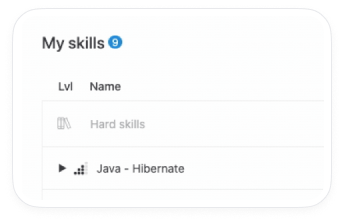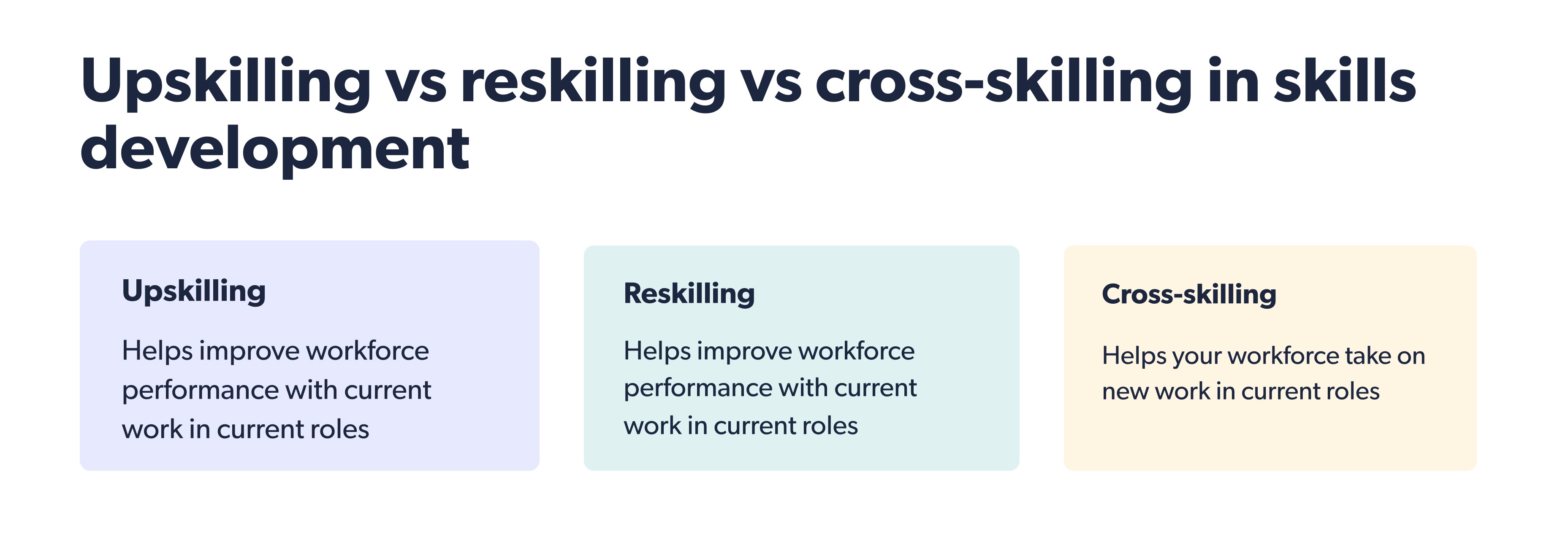Business Benefits of Cross-Skilling: Why It’s Important to Broaden Your Skillset
Crossover, crossword, cross-skilling! In this blog post, we’ll cross through skills diversification.
How did cross-skilling begin?
In the past, cross-skilling employees was primarily seen as a means of developing potential managers. However, cross-skilling has expanded beyond managerial candidates and is now considered valuable for employees at all levels.
Why is there an interest in cross-skilling growing?
As the job market becomes more competitive and technology continues to evolve, it’s becoming increasingly important for employees to develop a diverse set of skills and expertise. Cross-skilling, or learning and developing skills in multiple areas, is essential for employers and employees who want to stay relevant and competitive in today’s job market.
In this blog post, we explore:
- Benefits of cross-skilling for employees, including increased employability, productivity, job satisfaction, and career progression, and how cross-skilling can foster innovation and collaboration within organizations.
- Tips and strategies for employees interested in developing their cross-skilling abilities and how organizations can support and encourage their employees to embrace this vital practice.
Let’s dive in!
What is cross-skilling in the workplace?
Cross-skilling refers to developing skills and expertise in areas outside an employee’s current job responsibilities or sphere of knowledge. It involves learning and acquiring new skills outside an employee’s existing skillset, aiming to broaden their abilities and make them more versatile and adaptable to different roles and tasks.
What’s the difference between cross-skilling, upskilling, and reskilling?
Upskilling refers to learning new skills or improving existing skills to become more proficient in one’s current job or industry. This typically involves developing more specialized or advanced skills directly related to an employee’s current role, aiming to improve performance, productivity, and career prospects.
Reskilling refers to learning new skills or acquiring new knowledge to transition to a new career or industry. This typically involves developing a new set of skills outside an employee’s existing area of expertise, pursuing a new career path, or taking advantage of new opportunities.
Source: iide.co
Cross-skilling examples
Cross-skilling refers to developing skills different from an individual’s primary skills. Here are some examples:
- Engineers can learn basic coding skills to enhance their ability to work on software projects.
- Writers can learn graphics and design skills to create visual content for their written pieces.
- Salespeople can learn basic accounting skills to understand financial statements and make more informed business decisions.
- HR managers can learn data analysis skills to make data-driven decisions.
Due to the tight labor market and continuous technological advancements across industries, employers face challenges in hiring new talent. As a result, many companies are shifting their focus towards upskilling, reskilling, and cross-skilling their current employees instead of solely relying on hiring new workers. Among the benefits of motivating employees to engage in upskilling, reskilling, and cross-skilling are effective succession planning, better employee retention, improved talent management, cost efficiency, and personal growth. We’ll describe each below.
Get a guide to cross-skilling practices
Learn how adopting cross-skilling practices helps an organization retain employees and improve their careers. We cover definitions and benefits of cross-skilling, case studies from prominent companies, and strategies for implementing them on a budget.
Importance of cross-skilling in today’s work environment
Cross-skilling, or learning new skills outside of one’s primary job function or area of expertise, is becoming increasingly important for employees in today’s rapidly changing work environment. Here are some reasons why cross-skilling is essential for employees:
- Career advancement. By developing a broader range of skills, employees can increase their value to their organization and become more competitive in the job market. Cross-skilling can open up new career paths and opportunities for advancement.
- Adaptability. In today’s fast-paced business environment, companies need employees who can adapt to changing circumstances and take on new challenges. Cross-skilling helps employees become more flexible and adaptable, better equipped to face changing job requirements and new roles.
- Resilience. Cross-skilling can help employees develop resilience or bounce back from setbacks. Employees with diverse skills are better equipped to handle unexpected changes or disruptions in their work environment.
- Collaboration. When employees better understand different job functions and areas of the business, they can collaborate with colleagues and contribute to team projects. Cross-skilling can foster a culture of collaboration and teamwork within an organization.
- Personal growth. Cross-skilling can be personally fulfilling for employees. Learning new skills can boost confidence, increase job satisfaction, and provide a sense of accomplishment.
According to research by Josh Bersin and his team, employees with diverse skills are 47% more likely to be hired and 33% more likely to be promoted than those with a more limited skillset. Additionally, cross-skilling can help companies reduce hiring costs by allowing them to fill multiple roles with the same employee, thereby increasing productivity and efficiency.
Cross-skilling helps companies become more flexible and adaptable
Cross-skilling helps companies become more flexible and adaptable by:
- Reducing skills gaps. Cross-skilling enables employees to fill in for absent colleagues, leading to a more efficient and effective work environment.
- Promoting collaboration. When employees learn new skills, they become more open to sharing their knowledge with colleagues, leading to better teamwork and improved productivity.
- Meeting changing business needs. Employees with cross-functional skills are better equipped to handle new challenges and take on different roles as required.
- Retaining employees. Employees who feel they are learning and growing in their careers are more likely to stay with their employer.
- Improving decision-making. Employees with cross-functional skills are better equipped to make informed decisions as they have a broader understanding of the business and its operations.
- Being more efficient. Cross-skilling can improve overall efficiency by reducing the need for specialized employees and enabling teams to work more collaboratively. This can result in a more streamlined and productive workflow with fewer delays and bottlenecks.
- Increasing motivation. Cross-skilling can help employees feel more engaged and motivated in their work, as they can learn new skills and take on new challenges, leading to job satisfaction and a greater sense of ownership over their work.
The World Economic Forum has found that problem-solving, critical thinking, creativity, people management, coordinating with others, emotional intelligence, judgment and decision-making, service orientation, negotiation, and cognitive flexibility are expected to be the top 10 skills required to develop by 2025. By cross-skilling, employees can develop these skills and be better equipped to handle future workplace challenges.
How to embrace cross-skilling with professional HR tools
Cross-skilling refers to developing skills and knowledge in multiple areas or disciplines to enhance versatility and employability. For example, cross-skilling in HR can involve training employees to acquire new skills and knowledge in areas outside their primary job function or field. Here are several examples of how cross-skilling works with the assistance of the smartPeople platform — a talent marketplace that enables internal talent mobility, upskilling, reskilling, and cross-skilling of employees as well as strategic workforce planning.
- Skills profile. smartPeople creates a personal profile based on an employee’s skills and interests. A personal dashboard gives an overview of which skills an employee possesses at what level. It detects exactly which skills employees can develop to achieve professional goals and stay future-oriented.
- Best-fit matching. AI algorithms calculate a matching score between an employee’s skills and available tasks or job roles. As a result, employees will see their perfect matches and know which skills they have to work on to fulfill job requirements.
- Individual learning journey. Based on career goals, an employee will get a personalized learning journey to close skills gaps and prepare for a future project or dream job. Instead of the standard prescribed training, your employees will get tailored step-by-step suggestions, including the estimated effort and concrete training they need to complete.
- Knowledge sharing and mentoring. Your employees can share their knowledge and experiences by working on new projects and challenging themselves with new tasks. In addition, your employees can get to know colleagues who are experts in specific areas and find a mentor for a particular topic — or become a mentor themselves.
Summing up
Cross-skilling is an increasingly valuable practice in today’s job market, benefiting employees and employers. Employees can use cross-skilling to increase their employability, productivity, job satisfaction, and career progression by developing diverse skills and expertise. In addition, cross-skilling can foster innovation, collaboration, and resilience within organizations, making them more flexible and adaptable to changing business needs.
Employees can explore different tips and strategies for developing their cross-skilling abilities to take advantage of these benefits. At the same time, organizations can encourage their employees to embrace cross-skilling. With the right mindset and approach, cross-skilling can help individuals and companies thrive in a dynamic and competitive work environment.
Stay up to date with our newsletter
Every month, we’ll send you a curated newsletter with our updates and the latest industry news.




























 info@hrforecast.de
info@hrforecast.de
 +49 89 215384810
+49 89 215384810





 rawpixel
rawpixel